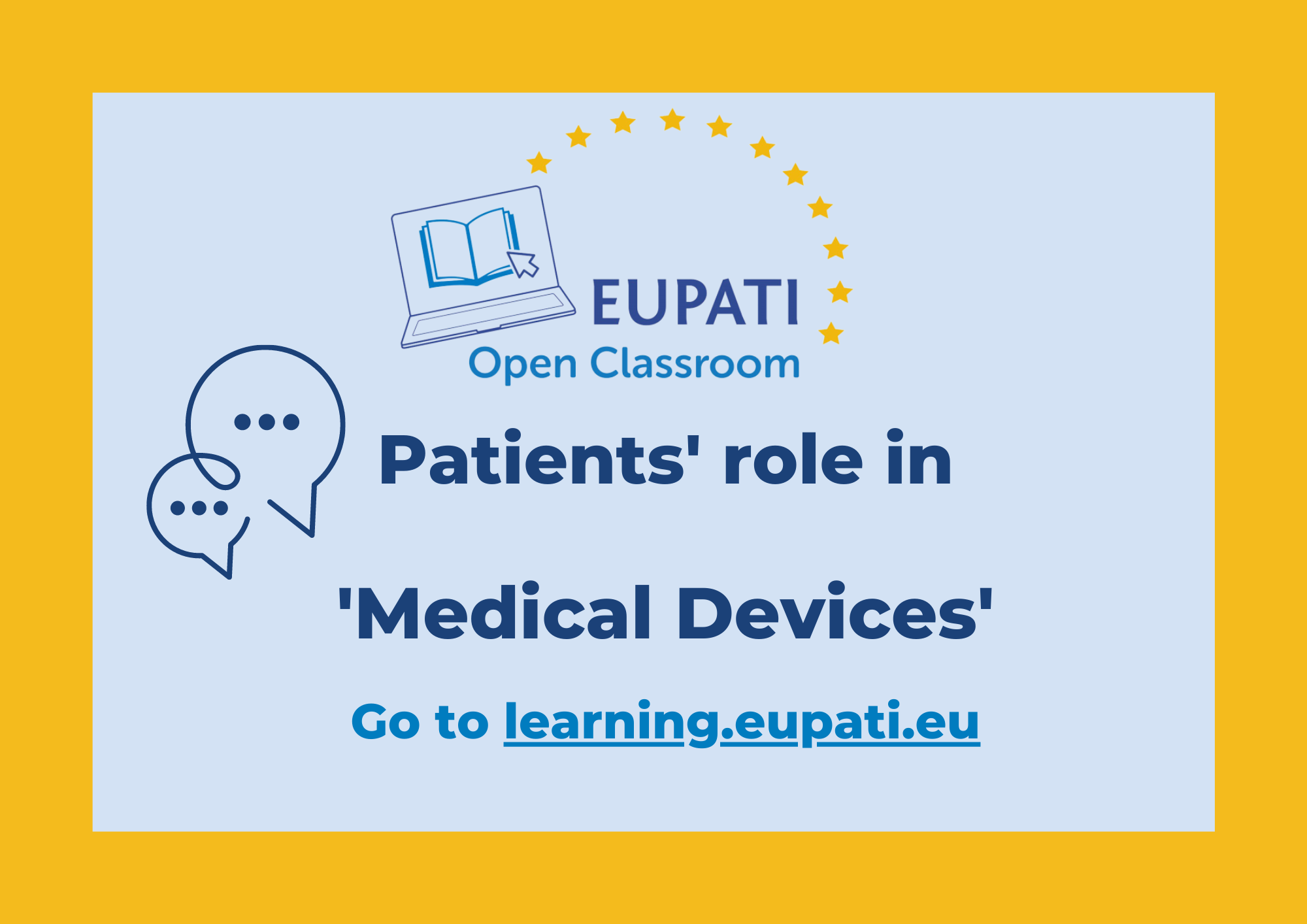
Conversation with EUPATI Fellow Paola Kruger
Paola Kruger graduated as a EUPATI Fellow in 2016 as part of the second cohort of patient experts. Since then, she has focused her attention on patient involvement, especially in clinical research. Paola is engaged as a patient expert at the European Medicines Agency (EMA), as a speaker at various events both locally and internationally, and represents patients on several boards and scientific committees.
Paola contributed to the development of the EUPATI training module in Medical Devices for the Open Classroom (launched in May 2022) along with other EUPATI Fellows and representatives from the Medtech sector and academia. We recently sat down virtually with Paola to chat about patient engagement in Medical Devices and her involvement in this module designed with patients for patients.
For people unfamiliar with the term ‘medical devices’ – could you explain what we mean by ‘medical devices’?
To borrow the WHO’s definition: a medical device can be any instrument, apparatus, implement, machine, appliance, implant, reagent for in vitro use, software, material or other similar or related article, intended by the manufacturer to be used, alone or in combination for a medical purpose. There is a great variety of medical devices, going from simple spectacles to complex programmable pacemakers and so on. Additionally, medical devices include in vitro diagnostic (IVD) products, such as reagents, test kits, and blood glucose meters.
What is your personal experience of patient engagement in medical devices?
I have been involved in several activities, from co-designing an app (which is currently tested in a Randomised Clinical Trial to make sure it is really valuable) to providing user experience as well as being involved in the approval of regional legislation (in my country health is a regional matter) to have patients involved in the medical devices procurement process.
How has the medical devices field changed in the last few years?
It has changed and is changing, considerably. The major shift has been from going to think that patients are just the end users of the process to recognising that patients should be involved in medical devices development to improve health and quality of life outcomes. This is particularly important at a time when we see the number of medical devices increase every year and become more and more a significant companion to patients’ health: medical devices have become almost as important as medicines.
We have witnessed a similar shift with pharma companies and now MedTech industries are on the same journey even if a few steps behind. But this is purely because of the very technical and business-oriented nature of this sector. However, the shift has started and we know very well that there is no coming back from that. We can only go forward. Together.
What are the key factors for successful patient engagement in medical devices?
The most important key factor is to treat patients as equal partners, which means learning to value their role and finding a way to collaborate with them that is fair and inclusive: the guiding principle should be co-creating. However, to be able to do that patients have to speak the same language as developers and understand the lifecycle of a device. That’s why training is so important.
What recommendations would you have for the medical device industry?
The involvement of patients in Medical Devices development is still limited often because MedTech industries find it hard to understand how such involvement can benefit them and, especially, their products. Industries have to undergo a cultural change that will take them from making devices for patients to making devices with patients and, as a result, that will improve acceptance, compliance and quality of life. Once we gather hard evidence of such benefits, involving patients will become common practice.
On this note, I would like to point out that the role of patients in the medical devices sector is also growing in the area of procurement which is directly connected to reimbursement, so collaborating with patients is a sound move to achieve those value-added outcomes which is what payors are looking for.
Why have you decided to be involved in the development of the EUPATI Medical Devices Module?
I think that today, and especially after the coming into force of the new Regulation on Medical Devices (EU) 2017/745,) patient training would not be complete if it did not include a Module on Medical Devices as these play an important role in patients’ lives. A small example: we had three EUPATI Fellows involved in the development of this Module, all three using Medical Devices! Hence, it seems pretty clear how empowering patients through education in this field can help to make our lives better and point the industry in the right direction.
What are the key learning outcomes of this Module?
The most important thing that you learn is that patients can be involved in so many different steps in the medical devices development journey and the roadmap explains exactly how and where.
What would you like to share with your fellow patient representatives about the Medical Devices Module?
In true EUPATI’s spirit, the Module has been developed with patients for patients, so you will find it accessible and patient-oriented. I hope at the end of the Module patients will feel motivated to use what they have learnt in practice seeking opportunities to contribute to medical devices development.
Date posted: November 16, 2022
Categories: Uncategorized



